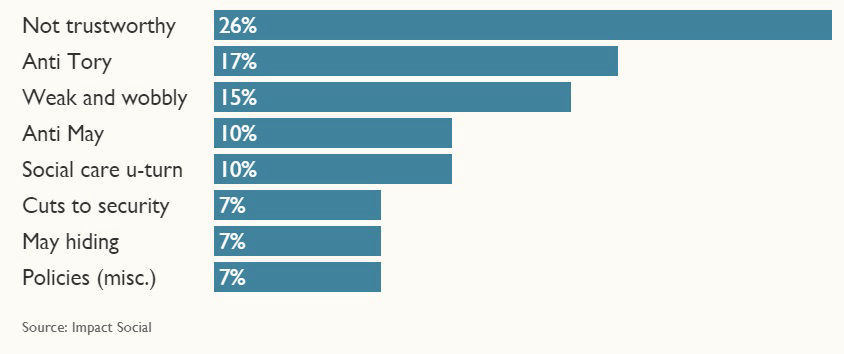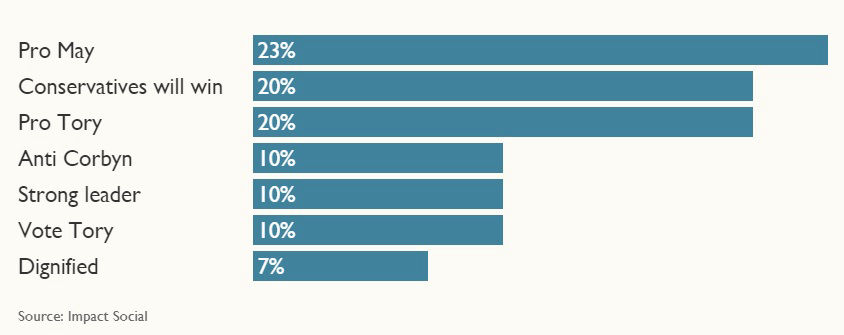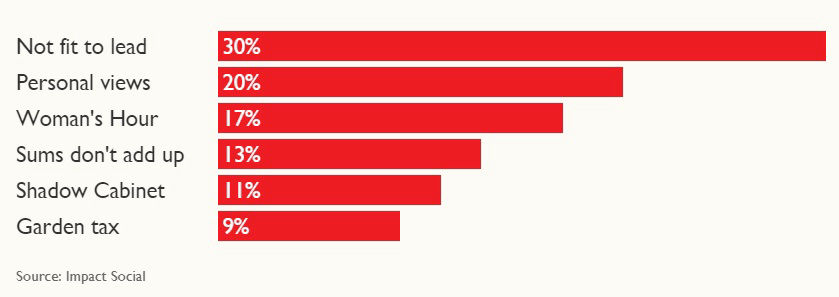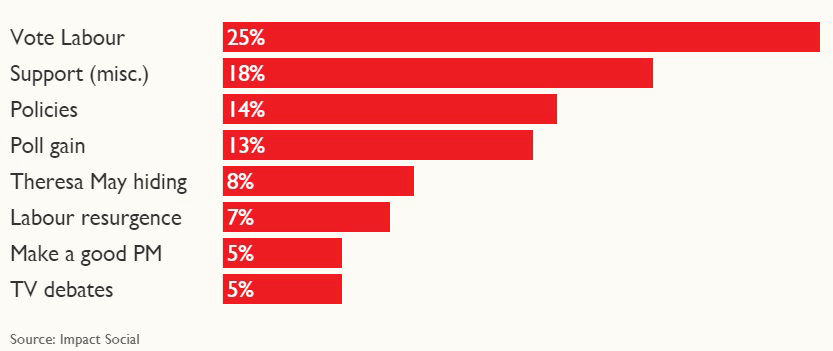Times Red Box: Corbyn’s Catch-up Shows the Shallowness of May’s Campaign
June 3rd at 12:00am
By Jimmy Leach
The horizon for this election used to be June 9. We all reckoned we knew what would happen at 10pm on the 8th. The bongs would fade and a Dimbleby would announce exit polls showing a convincing victory for Theresa May. The gamble of a snap election would pay off.
The work would begin the following day, the only question being how May would use her enhanced majority to give herself leeway in the Brexit negotiations to follow.
Jeremy Corbyn was assumed to be hapless and helpless, and while the match between Britain’s ‘leading’ politicians was more Premier League vs Ryman League, we knew how this was going to end.
That scenario is now a distant memory. Things have changed — we expected a procession, but then, suddenly, an election broke out. The signs came first in the social media numbers. Then the opinion polls. And now there’s a real sense that momentum (small m) is only heading one way.
From May’s point of view, this is self-inflicted. There’s a real sense that she’s been found out. The robotic tic of ‘strong and stable’ has started to grate. The dementia tax u-turn and decision to hide from the TV debate mocked declarations of leadership.
And, meanwhile, Corbyn began to act like his medication had finally been delivered. Calmer and less like the grouchy man who punctured your football if it landed on his allotment, he began to creep up on May.
To see if that trend is continuing, the social media analysis company Impact Social has been tracking online conversations since the start of the campaign, most recently looking at posts on social media platforms and open news forums, in the seven days to midday on Thursday.
What social media thinks of the parties
This week’s figures will show nothing to cheer the increasing glumness in the Tory high command.
First, to Corbyn’s turnaround. He was the subject of 350,000 posts, about a 42 per cent share of the voice on social media. About standard for the challenger.
But there’s a striking contrast from the first week of the campaign, where only 12 per cent of posts were positive and 39 per negative. This week the figures look very different — 33 per cent are positive and 16 per cent negative. A quite remarkable change in fortune.
When this campaign all began, so many, many moons ago, this was a Brexit election and the Tory strategy was solely based around May as The One We Can Trust to do battle with those conniving Europeans.
With that as the battleground, Corbyn floundered, as he looked weak, and his party looked confused on Europe. The numbers then didn’t look promising for Labour.
But as the debate moved on with manifestos published and actual policy became the centre of conversations, so Labour and Corbyn have looked stronger, while Tory attacks on them have started to fall on stony ground.
Conservatives: the negatives
Conservatives: the positives
Not to say that it’s all rosy, there’s plenty of negativity about Corbyn being unfit to lead (30 per cent of negative posts), and he hasn’t exactly got away with his farcical turn on Woman’s Hour (17 per cent), but the digital strategists in the Conservative HQ trying to prompt debate on Corbyn’s record on anti-terrorism legislation and his alleged sympathies with the IRA with paid-for adverts has barely landed at all.
Similarly, Corbyn’s decision to suggest, directly post-Manchester, that foreign policy fuelled terrorism seems not to have hit a chord, for good or ill. Voters are much more ambivalent on foreign policy than politicians.
Attacks on his possible Garden Tax, did resonate. Voters really do care what happens in their own backyard.
The positivity around Corbyn was as much about atmosphere as specifics — general talk about policies (14 per cent), about a resurgence (7 per cent) and better poll numbers (13 per cent) suggested that Corbyn hasn’t found a golden key to No 10, but do suggest that the manifesto, costed or not, offered more hope to people than the negativity of May’s approach.
So while Corbyn and Labour have shown greater competence than expected, the real story has been how poor the Tory campaign has been.
Impact Social’s data shows that they have failed to improve the positive online posts about May and her party, which have remained steady at 10 per cent, this week out of 493,000 posts (58 per cent of the share of voice, normal for the incumbent).
What’s noticeable is that the move is from people who seemed neutral about her into negativity. If her only currency was strength and stability and if those qualities are now in serious doubt, then the electorate is reduced to a choice between two people they do not rate. Choosing between two idiots when they’re not sure which is worse.
Labour: the negatives
Labour: the positives
And if that’s the case, then they may as well head back to tribal loyalties. So the negativity around May and the Tory party centres on the perceived re-emergence of the Nasty Party, a position supported by such needless interjections like a free vote on foxhunting.
General anti-Tory/May sentiment (27 per cent of the negative posts) are matched by the idea that May isn’t to be trusted (26 per cent) and that she hid from the TV debate (7 per cent) and that she’s ‘weak and wobbly’ (15 per cent). Of all her unpopular policies, the social care U-turn and cuts to policing and security budgets make it through the noise to be noticeable.
Also noticeable, the pro-May posts have little to hold on to — they are varying noises of support around the themes of May, strength and remembering to vote Conservative. Few in their number are offering a reason for that vote, in among fewer numbers prepared to publicly back her.
As the debate has moved further and further from Brexit, so May has got weaker and weaker. Unless she can turn the central topic of the final week’s campaigning back to that, there is little prospect of the trend towards Corbyn being reversed. That’s not to call this a victory for Labour, the chances are that they started too far back for that, and the returning support may yet prove fickle.
But this has been a poor campaign for May and it now looks like the election gamble is not going to pay off, and she’ll return to No 10 (probably) considerably weaker (certainly) than when she started. Come June 9, Brexit will just be one on a long list of problems that she has given herself.
Jimmy Leach is a former head of digital communications in Downing Street






